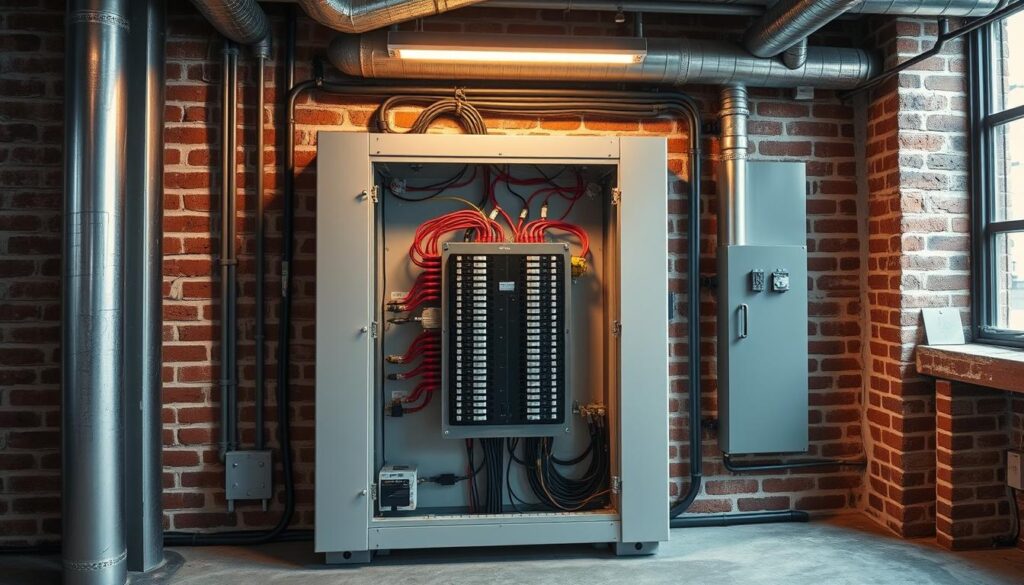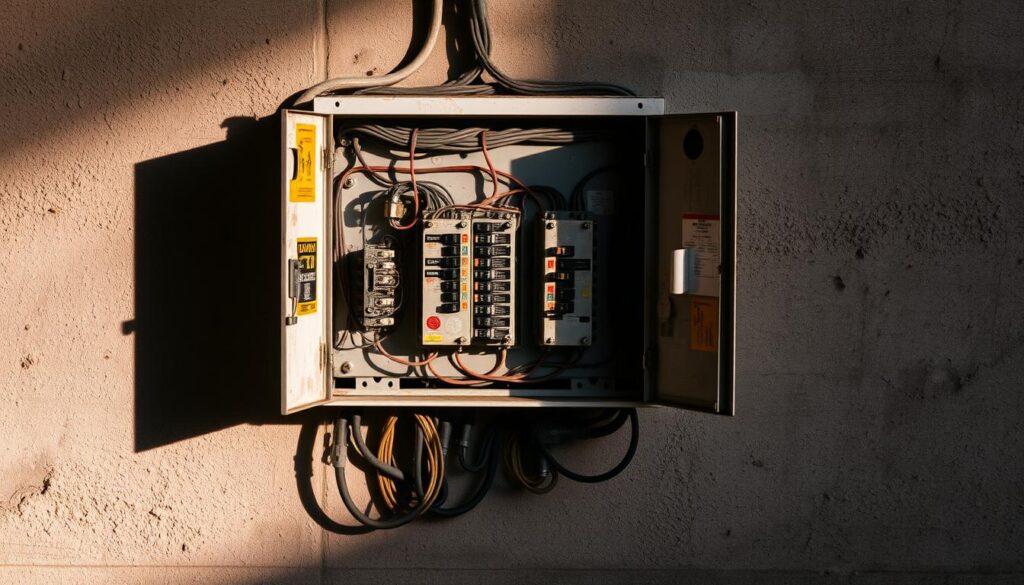
Your home’s electrical panel is its heart. It controls all the power that flows to your lights, appliances, and devices. If it fails, your safety could be at risk. Yet, many homeowners overlook this crucial part of their home. They don’t realize that old or damaged panels can cause fires, shocks, or appliance damage.
In this blog, you’ll learn everything you need to know about electrical panel safety. We’ll explain why regular checks, proper maintenance, and timely electrical panel repair are essential. We’ll also cover signs of trouble and the importance of hiring licensed electricians for any electrical panel installation or electrical panel upgrade near me.
What Is an Electrical Panel?
An electrical panel, often called a breaker box or fuse box, distributes electricity throughout your home. It receives power from the utility company and channels it to various circuits. A breaker protects each circuit. These breakers “trip” or shut off the power when they detect an overload. This helps prevent electrical fires and severe damage.
If your panel is outdated, overloaded, or damaged, it can’t protect your home as it should.
Why Electrical Panel Safety Matters
Electrical panels are vital for safety. A faulty panel can lead to:
- Power outages
- Electrical fires
- Appliance damage
- Electric shock hazards
The National Fire Protection Association (NFPA) states that faulty wiring and equipment cause over 30,000 residential fires each year in the U.S. That’s a serious risk you don’t want to ignore.
Taking care of your electrical panel wiring is one of the most intelligent decisions you can make as a homeowner.
Signs You May Need Electrical Panel Repair
Don’t wait for disaster to strike. If you notice these warning signs, it’s time for repair:
- Frequent breaker trips: This suggests your circuits are overloaded.
- A burning smell or sparks: These are signs of overheating and dangerous wiring.
- Flickering or dimming lights indicate an unstable power supply.
- Old panel (20+ years): Older panels may not be able to handle modern power demands.
- Rust or corrosion can lead to shorts and increased fire risks.
- Buzzing noises: Suggests loose wiring or electrical arcing.
If any of these sound familiar, don’t delay. Call a licensed electrician immediately.
The Importance of Electrical Panel Installation by a Pro
Electrical panel installation isn’t a DIY job. It’s complex and dangerous.
A licensed professional knows how to:
- Safely handle high-voltage connections
- Install code-compliant wiring
- Ensure proper grounding
- Label all circuits correctly.
Improper installation can lead to code violations, fire risks, and voided insurance claims. Always leave it to an expert.

When to Upgrade Your Electrical Panel
Is it time for a new panel? These signs point to the need for an upgrade:
- You’re adding new appliances or circuits.
- Your home still uses fuses.
- You’ve added a home office or EV charger.
- You’re planning a remodel or addition.
- You experience frequent breaker trips.
In such cases, search for an electrical panel upgrade near me to find licensed professionals in your area. An upgrade can increase safety and handle higher electrical loads.
What Is Involved in Electrical Panel Repairing?
Electrical panel repairing involves diagnosing and fixing issues within the breaker box. Common repairs include:
- Replacing faulty breakers
- Tightening loose wires
- Fixing corroded connections
- Removing outdated components
- Replacing damaged bus bars
A technician typically begins with a safety inspection. They’ll test voltage, check connections, and ensure all circuits work properly.
Never attempt repairing without training. The risk of shock, fire, or death is high.
Understanding Electrical Panel Wiring
Electrical panel wiring connects the primary service line to branch circuits in your home.
This wiring must:
- Be correctly sized
- Use the correct gauge and material.
- Be properly grounded
- Follow strict electrical codes.
Improper wiring can cause arcing, overheating, and fires. It can also damage your electronics and appliances.
A licensed electrician ensures that wiring is safe and efficient during installation or repair.
Safety Tips for Homeowners
You don’t have to be an expert, but you should follow these safety practices:
- Schedule regular inspections – Every 3–5 years or after any major renovations.
- Keep the panel accessible – Don’t block it with furniture or storage.
- Know how to shut off power – Especially during emergencies.
- Don’t overload circuits – Spread out your device usage.
- Never ignore warning signs – Like buzzing, heat, or a burning smell.
And most importantly, always hire a qualified professional for electrical panel installation or repair.
What to Expect During an Electrical Panel Upgrade
An upgrade usually takes 6–8 hours. Here’s a typical process:
- Inspection – The electrician checks the existing system
- Power shut-off – Utility company disconnects power
- Old panel removal – Safely dismantling the current unit
- New panel installation – Includes breakers, wiring, and grounding.
- Reconnection and testing – Power restored and circuits tested
- Code inspection – Final inspection ensures compliance
Upgrading to a 200-amp panel provides greater flexibility and supports heavy-load appliances, such as HVAC units and electric vehicle (EV) chargers.
Hiring the Right Electrician
Not all electricians are equal. When choosing someone for repair or installation, ask:
- Are they licensed and insured?
- Do they have good reviews and references?
- Do they provide written estimates?
- Do they offer emergency services?
- Are they familiar with local code requirements?
Use local searches, such as “electrical panel upgrades,” to find trusted professionals in your area.
Conclusion
Your electrical panel is the gateway to power in your home. Keeping it safe and functional is crucial. That means regular maintenance, quick response to issues, and professional help with electrical panel installation, electrical panel repairing, or upgrades. Don’t ignore warning signs. Don’t DIY repairs. And don’t wait until it’s too late. When in doubt, search for an electrical panel upgrade and find a trusted expert. Your home—and your family’s safety—depends on it.


